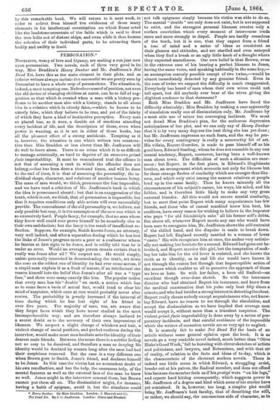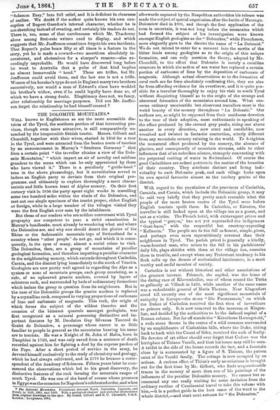PERSONATION.*
NOVELISTS, weary of love and bigamy, are making a run just now upon personation. Two novels, each of them very good in its way, Miss Braddon's Henry Dunbar and Mr. Jeaffreson's Not Dead Yet, have this as the main element in their plots, and as inferior writers always imitate the successful we are pretty sure by December to have a whole crop of personations. The situation is, indeed, a most tempting one. No bouleversement of position, not even the old device of changing children at nurse, can be so full of sug- gestion as that which is created when a man with a history pro- fesses to be another man also with a history, stands to all about him in a relation which is utterly false,—which he knows to be utterly false, which they believe to be true, and yet of the falsity of which they have a kind of instinctive perception. Every man so placed has, as it were, a double set of emotions attending every incident of life, and the description of these, even when power is wanting, as it is not in either of these books, has all the pleasant effect of a strong antithesis. Tempting as it is, however, the situation is one which writers less construc- tive than Miss Braddon or less clever than Mr. Jeaffreson will , do well to leave alone. There is no crime which it is so difficult to manage artistically, so hard to deprive of its excessive prima facie improbability. It must be remembered that the offence is not that of assuming a rank to which the offender does not belong,—that has been done a thousand times, and will be done to the end of time, it is that of assuming the personality, the in- dividual shape, character, and relations of another human being. The mass of men would, we think, pronounce the feat impossible, and we have read a criticism of Mr. Jeaffreson's book in which the idea is pronounced absurd ; but that is an exaggeration of the truth, which is not, we think, that all personation is impossible, but that it requires conditions only able artists will ever successfully provide. The concealment of the old personality is, we believe, not only possible but easy, it is the assumption of the new one which is so excessively hard. People fancy, for example, that no man whom they knew well could ever prove himself to be somebody else to their own satisfaction; but the fancy is the result of insufficient re- flection. Suppose, for example, Smith knows Jones, an attorney, very well indeed, and after a separation during which he has lost the links of Jones's progress meets a peer or a coalheaver whom he fancies at first sight to be Jones, and is coldly told that he is under an error. Would an average person remain certain that it really was Jones after all ? We suspect not. He would simply, unless personally interested in demonstrating the truth, set down the case as the oddest one of identity he had ever come across, if a stupid man explain it as a freak of nature, if an intellectual one reason himself into the belief that Jones's after all was a "type face," and there were many exactly like him. The popular notion that every man has his " double" on earth, a notion which has as to some faces a basis of actual fact, would tend to clear his mind of suspicion, which once at rest would probably never after revive. The probability is greatly increased if the interval of time during which he has lost sight of his friend is over five years. The majority of men, too, are aware that they forget faces which they have never studied in the most incomprehensible way, and are therefore always inclined to a secret doubt as to the accuracy of their own impressions of likeness. We suspect a slight change of whiskers and hair, a violent change of social position, and perfect coolness during the interview, would make most men hesitate asto the identity of their dearest male friends. Between the sexes there is a subtler feeling not so easy to be deceived, and therefore a man so denying His identity would be doubted by women long after the men had had their suspicions removed. But the case is a very different one when Brown goes to Smith, Jones's friend, and declares himself to be Jones. In this case the victim has no antecedent doubt of his own recollection, and has the help, the enormous help, of the mental features as well as the external face of the man he knew so well. Jones might in the interview conceal them, but Brown cannot put them all on. The dissimulator might, for instance, having a habit of epigram, avoid it, but the simulator could • Henry Dunbar. By Miss Braddon. London: J. Maxwell and Co. Pot Dead Yet. By 1 C. Jeaffreson. London : Hurst and Blaokett.
not talk epigrams simply because his victim was able to do so. The mental " double " not only does not exist, but is not supposed to exist, and the strongest personal likeness creates only a surface conviction which every moment of intercourse tends more and more strongly to dispel. People are hardly conscious of the truth, but it is one, that they expect from a friend a tone of mind and a series of ideas as consistent as their glances and attitudes, and are startled and even annoyed when they find a break or an ugly little knob of a thought where they expected smoothness. Oar own belief is that Brown, even in the extreme case of his bearing a perfect likeness to Jones, having the same voice, and speaking habitually in. the same key,— an assumption scarcely possible except of two twins,—would be almost immediately detected by any genuine friend. Even in the case of twins we suspect the difficulty is much exaggerated. Everybody has heard of men whom their own wives could not tell apart, but did anybody ever hear of the wives giving the slightest credence to that statement?
Both Miss Braddon and Mr. Jeaffreson have faced the difficulty admirably; Miss Braddon by making a case apparently of simulation really one of dissimulation only, Mr. Jeaffreson by a most able use of minor but converging incidents. We must not detail Miss Braddon's plan, for the authoress deprecates anticipations of her plot, and we can only say of Henry Dunbar that it is by very many degrees the best thing she has yet done ; but Mr. Jeaffreson expresses no such fears, and the way he pro- vides for every contingency is really a noteworthy bit of art. His villain, Rupert Guerdon, is made to pass himself off as his good hero, Edward Starling, whom he does not resemble in any one mental tendency, Rupert, moreover, having been a well-known man about town. The difficulties of such a situation are enor- mous; but Rupert, in the first place, is Edward's illegitimate brother, an arrangement which accounts not only for likeness but for those strange flashes of similarity which are stronger than like ness, and which only exist among the nearest relatives or people bred up in the same family. Then he knows minutely all the circumstances of his subject's career, his ways, his mind, and his foibles, and is therefore little likely to make any very gross external blunder. All this would not secure mental similarity, but to meet that point Rupert with many acquaintance has few friends, and those who of casual mankind know him best, his creditors, have every reason for wishing to believe in the impostor who pays "for old friendship's sake" all his former self's debts. But above all, whenever Rupert meets any one who would have been sure to recognize him, Mr. Jeaffreson shows the self-restraint. of the skilled hand, and the disguise is made to break down. Rupert had left England secretly married to a woman of lower "caste." His wife recognizes him at once, the author very artistic- ally not making her hesitate for a second. Edward had gone out be- trothed, and Rupert marries this girl, but the temptation of mak- ing her take him for the old lover is resisted, and she knows the truth as to identity, as in real life she would have known it not through the reason but through that imperceptible action of the senses which enables us all to perceive the approach of those we love or hate. So with her father, a keen old Radical—an excellent though over-done sketch. So with the insurance director who had obtained Rupert his insurance, and knew from the medical examination that his pulse only beat fifty times a minute, and who bad besides a strong interest in detecting the cheat. Rupert really cheats nobody except acquaintances who, not know- ing Edward, have no reason to see through the simulation, and accept the dissimulation as we have implied that average men would accept it, without more than a transient suspicion. The violent prima facie improbability is done away by a series of pre- paratory incidents, and that careful avoidance of the impossible which the writers of sensation novels are so very apt to neglect.
It is scarcely fair to make Not Dead Yet the basis of an article without some general opinion upon the book. It is as novels go a very readable novel indeed, much better than "Olive Blake's Good Work," full to bursting with clever sketches of artists and politicians, and lawyers, and Bohemians, and with that air of reality, of relation to the facts and ideas of to-day, which is the characteristic of the cleverest modern novels. There is indeed one little scene in which Edward, a struggling artist, breaks out at his patron, the Radical member, and does not offend him because the member feels as if his protege' were "on his legs," and expects hard hitting consequently, which suggests power in Mr. Jeaffreson of a degree and kind which none of his stories have yet contained. It is, however, too long, a simpler plot would bring Mr. Jeaffreson's best faculty, that of describing the still, or rather, we should say, the unconscious side of character, as in
"Solomon Easy," into full relief, and it is deficient in clearness of outline. We doubt if the author quite knows his own con- ception of Rupert Guerdon's internal character, whether be is not sketching instead of creating, and certainly his readers do not. There is, too, some of that carelessness which Mr. Tbackeray alone among first-rate writers used to display, and which suggests that Mr. Jeaffreson sometimes forgets his own incidents. That Rupert's pulse beats fifty at all times is a feature in the story, yet he is made a coward—two assertions absolutely in- consistent, and abstemious for a sharper's reasons—also ex- ceedingly improbable. He would have discovered long before he went to Australia that a pulse of that kind implies an almost immoveable " head." These are trifles, but Mr. Jeaffreson could avoid them, and the last one is not a trifle. Women of his heroine's type do not in England marry two brothers successively, nor would a man of Edward's class have wedded his brother's widow, even if he could legally have done so, of which we have a strong doubt. Illegitimacy does not, we fancy, alter relationship for marriage purposes. Did not Mr. Jeaffre- son forget the relationship he had himself created ?































 Previous page
Previous page